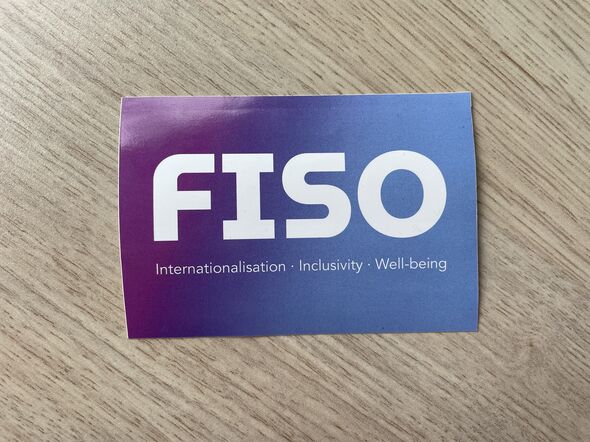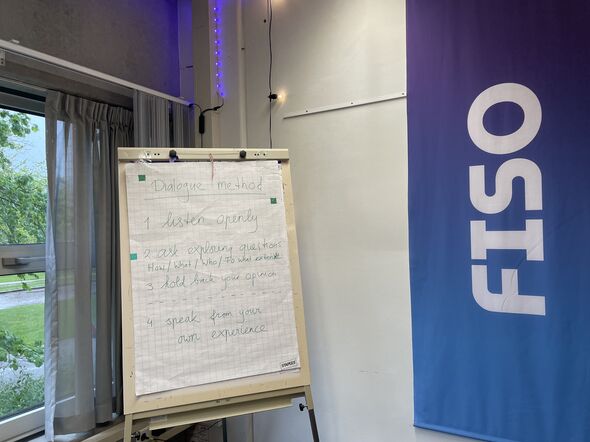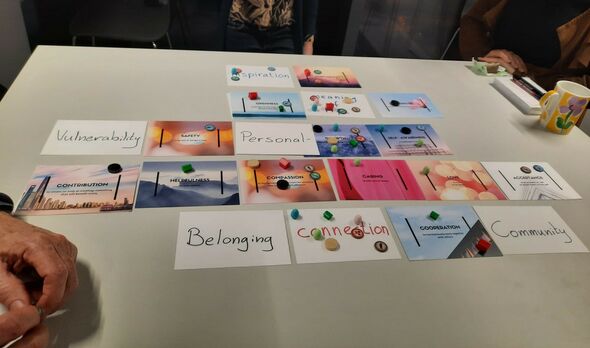
Different ideologies under one roof
“You have to look for the similarities, not the differences.”
How do you select general core values for different ideologies? According to FISO – the umbrella organization for the religious, LGBTQ+, international, vegan, and other associations – this is easier than it seems. “You have to look for the similarities, not the differences.”
Now the university is reviewing its core values, this term – ‘core values’ – is starting to make the rounds. But for a lot of people, the whole thing is still pretty vague. Because, what kinds of things fall into the definition of ‘core values’? And do the core values an organization chooses actually make a difference in practice? FISO and TINT sure like to think so.
FISO
“FISO is an umbrella organization for associations and parties, just like ESSF for sports clubs, Scala for cultural associations, and FSE for study associations,” says FISO secretary Gerben Vroegindeweij. Founded a mere three years ago, FISO is one of the youngest umbrella organizations. It originated from ‘Credo’, which was the umbrella organization for religious associations. ‘In addition to Credo, there were a number of associations that weren’t under an umbrella. In the search for a common denominator to bring these together, FISO was born.”
Now, FISO has eleven members: three Christian ones (Ichthus Eindhoven, Navigators Network and HOST), two international ones (Cosmos and AEGEE Eindhoven), an Islamic one (Salaam), one for life questions (TINT), a vegan one (VSA), one for the LGBTQ+ community (Compass), a spiritual one (Enter the Now), and one for student wellbeing (Lighthouse).
Our board and the boards of our members definitely know our core values
Inclusiveness, internationalization, student wellbeing
“As our members are fairly disparate, values are an important subject for us. How do we connect everyone?” says Niels Gorter, treasurer at FISO. FISO has a total of three core values: inclusiveness, internationalization, and student wellbeing. “Those are rather broad terms, but that does mean they cover all of our different members,” Vroegindeweij adds. When a new member wants to join FISO, the board first discusses whether the association or party in question aligns with the FISO core values. “It’s important for them to fit in with FISO.”
As opposed to TU/e’s core values, FISO’s ones are generally known within the umbrella organization. “Our own board and the boards of the members are familiar with them in any case,” Gorter says confidently. “You can’t really miss them because we had stickers printed and it’s the first thing you see on our website.”
Look for similarities, not differences
The different ideologies among FISO members actually never cause any problems, according to Vroegindeweij. “You have to look for the similarities, not the differences. There are always differences, but this shouldn’t be the guiding principle in bringing everyone together,” he asserts.
The boards of all ten FISO members meet approximately once every three months, at gatherings organized by FISO. “We work very hard to accommodate everyone as much as possible during these gatherings,” Gorter says. “For instance, we try to keep the food vegan for VSA and not to serve any alcohol for Salaam.” Gorter says that outsiders sometimes think there are ‘a lot of rules’, but in practice everything’s quite doable in his opinion. “We often make the deliberate choice of gathering early in the afternoon, because at that time of day nobody’s in the mood for alcohol or partying anyway,” he explains. “Last year, for instance, the previous board organized a clay workshop. That meant the only thing left to think about was the food.”
All students are welcome, no matter what philosophical or religious background they come from
Inclusive leadership
It’s clear FISO is rocking inclusivity, but they did get some help in this respect. For instance, the current board started out their year in office by taking the workshop on inclusive leadership taught by TINT, itself a member of the FISO umbrella. Once a Christian organization, TINT changed its statute to ‘religion neutral’ in 2017 and now they’re focusing on personal development and general life questions. "All students are welcome, no matter what philosophical or religious background they come from," Van Tuijl stressed. They also teach workshops on request, such as the one on inclusive leadership.
“In the workshop, we practice how you can create a safe space by using the dialogue method. This is a way of listening and asking open questions. And, when it’s your turn to speak, of speaking from your own experience,” Margit van Tuijl, life coach at TINT, explains. In addition to the dialogue method, conflict and values are also addressed during the workshop. To this end, TINT’s value cards are used, designed by former intern Laura Curta (see main photo). “All of these are spread out across the table. After the participants have taken a position, we have them select the values that are associated with that position,” says Van Tuijl. “The board in question may, for example, be discussing a certain change. Some are for it and some are against it. Together, we’ll reflect on why someone would be in favor or against it and what values come with this.” It sounds like a paradox, but TINT prefers it when there’s a conflict during the workshops. “That gives us something to work with and allows us to train the boards to resolve conflicts themselves in future.”
All association boards can take the TINT workshop on inclusive leadership. “We generally offer the workshops at the start of the year, just before the new boars take office,” says Gergely Fodor, student and event organizer at TINT. “Boards can approach us about this themselves. After all, it shouldn’t be an obligation; they get the most out of it when they really want to learn something themselves.”
If you’re interested in TINT’s workshop in inclusive leadership, send an email to info@tint-eindhoven.nl.
Value cards
When it was time to review the TINT core values, their own value cards also came in handy. “Around eight years ago, we first defined our core values, but those were in Dutch. When we wanted to translate them into English a few years later, we ran into problems. Because how do you translate culturally determined concepts? That made us start all over again,” says Van Tuijl.
In order to choose the new core values, TINT sat down with their team and the value cards. “Everyone was given five pawns, which you got to assign to the core values you thought were best. Then we reflected and gave arguments, after which some team members wanted to adapt their choices based on the new input.” In the end, the values that had the most pawns were merged into TINT’s current five core values: inspiration, meaning of life, personal growth, compassion, and connection.
we check off our five core values for everything we organize
Now, a few years later, these values are deeply rooted in TINT’s culture, says Van Tuijl. “In everything we do and every event we organize, we ask ourselves: does this align with our five core values? We literally write them down in our meeting document to check them off,” she says. “If we can’t, then we discuss the matter until it’s in line with what we stand for.”
Tips for TU/e
There you have it: at both TINT and FISO, core values appear to be more relevant than ever. When asked if they had tips for TU/e to ensure that the new core values – to be announced next academic year – won’t quickly be forgotten again, they responded: keep repeating them. Put them on your stickers, include them in your slogan, refer to them during discussions, check them off during big meetings, or start again if they can’t be checked off yet. Keep. Repeating. Them. Until everyone knows them, and truly lives by them.




Discussion